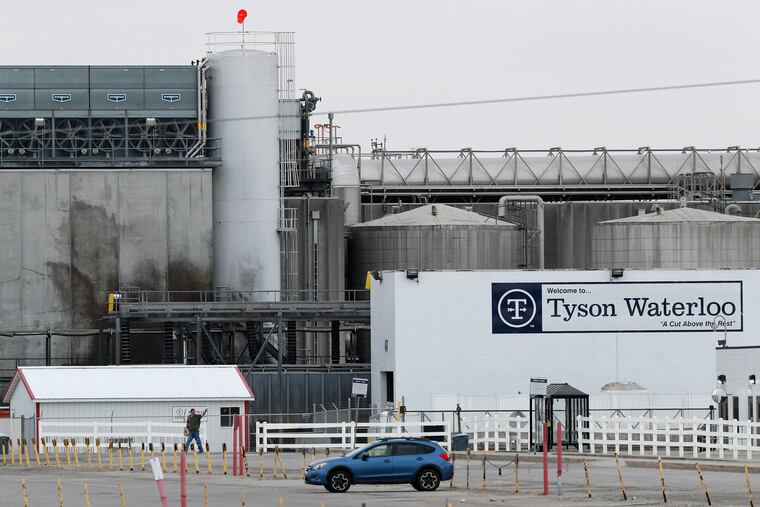Wisconsin judge’s ‘regular folks’ remark shows how pandemic exposes classism
The comment has reverberated across the country. “It’s defining some people as having lives that are not worth protecting,” one scholar said.

Earlier this week, the Supreme Court of Wisconsin overturned Gov. Tony Evers’ order for state residents to stay at home to contain the coronavirus.
During the course of arguments, Chief Justice Patience Roggensack was commenting on a spike in COVID-19 cases at a meatpacking plant when she observed, "These were due to the meatpacking, though. That’s where Brown County got the flare.
“It wasn’t just the regular folks in Brown County.”
That regular folks remark has reverberated across the country, with critics seeing it as a class-based “othering” — a case of a privileged person looking down at members of the working class.
“There are regular people and there are these others,” said Sherry Linkon, a scholar of working-class studies at Georgetown University. "There’s no question it’s classism — not recognizing other human beings as the same way ‘we’ are.
“It’s defining some people as having lives that are not worth protecting.”
Donna Scarboro, retired business agent for Service Employees International Local 668 in Philadelphia, condemned Roggensack’s statement as “disgraceful.”
She added, “It’s the same way people talk about sanitation workers. It’s another way to divide people. But everybody’s job deserves dignity.”
‘The history of blaming others’
The judge felt license to say what she did, critics charge, because bad times coax bad behavior. Ideas and opinions normally hidden emerge during times of stress and calamity.
“I think people get panicky about outsiders who could make them sick,” said Chris Martin, a professor of digital journalism at the University of Northern Iowa who writes about class and labor.
“The history of pandemics is the history of blaming others."
Along with classism, scholars say, there’s racism coiled in Roggensack’s remark, because many meatpackers are people of color.
There’s xenophobia, as well, because a good portion of those who cut steaks and chicken wings from animals are immigrants, Martin said.
He noted that it was the president of the United States, after all, who initially called COVID-19 “the Chinese virus,” although science proved many of America’s infections originated in Europe.
People stay in their own worlds
That Americans from upper classes harbor animus toward those in lower ones isn’t surprising, said Annette Lareau, a sociologist at the University of Pennsylvania who studies family life.
Many of us live in neighborhoods so isolated that we rarely interact, making mutual understanding difficult, she said.
“There are few spaces where people of different classes encounter each other,” Lareau said. “IKEA, the zoo, July Fourth parades. But increasingly, people stay within their own worlds.”
Ironically, as some working-class people are scorned, others are being lauded as essential workers because their jobs — grocery checkout clerks, delivery people, hospital janitors — place them on the front lines of the pandemic.
“I’ve never seen so many professional people thanking working people,” said Jessi Streib, a Duke University sociologist who studies inequality.
But lionizing bus drivers and supermarket clerks as heroes is disingenuous and unhelpful, noted Patrick Dixon, a research analyst at Georgetown’s Kalmanovitz Initiative for Labor and the Working Poor, and an expert in poultry processing and work-safety issues.
“It’s a cute thing to say, but these workers need political support to do their jobs safely, not rhetorical support and plaudits. Otherwise, saying ‘hero’ is kind of empty.”
Who is doing the work
Dixon said the Wisconsin judge’s remark denigrating meatpackers “betrayed an ignorance of who’s doing that job.”
In recent years, plants have hired workers from African and Middle Eastern war zones, many of whom have professional degrees but lack the language skills to move up in America, Dixon said.
The work is dangerous. In March, an Alabama poultry-plant worker was decapitated, Dixon said, an event that garnered little notice. “If a stockbroker or physician lost his head on the job, we would have heard a lot more about it,” he added.
Martin said meatpackers don’t need applause; they could use shields between workers, and overall slow-downs of meat processing lines to prevent workers from cutting too quickly and hurting themselves.
“But slower lines mean fewer profits,” he said.
On top of that, COVID-19 cases are skyrocketing among workers who stand shoulder-to-shoulder in such plants, which refuse to close, Martin added. In the JBS Packerland meatpacking plant that Roggensack had referenced, the number of workers testing positive increased from 60 to 800 in a two-week period.
Unfortunately, workers may expect little true respect for their labors, said Dermot Delude-Dix, research analyst for Unite Here Local 274 of the hospitality workers union in Philadelphia.
“The judge’s suggestion that those who fell ill are less than human is appalling,” he said. "But it’s reflective of the disdain some feel.
“We depend on low-wage workers, often immigrants and people of color, to do the work that is literally essential for our survival.”